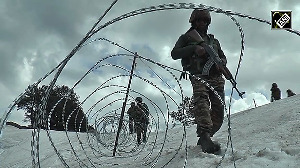Amidst worsening ties with the United States, Russian President Vladimir Putin on Friday signed a decree suspending Russia's obligations under the cornerstone arms cut treaty with the West, inked at the end of the Cold War by the ex-Soviet Union.
According to the Kremlin press release, Putin signed a law on a moratorium on Russia's participation in the Conventional Forces in Europe Treaty earlier, which was unanimously cleared by both houses of the Russian Federal Assembly (Parliament) and will come into effect at midnight on December 12.
The Russian Foreign Ministry said the upcoming moratorium does not stipulate permanent withdrawal from the CFE Treaty. Moscow will resume its obligations as soon as NATO countries ratify the adapted version.
The original CFE treaty was signed in December 1990 by 16 NATO countries and six Warsaw Pact members. The document had set equal limits for the parties on five categories of conventional weapons - battle tanks, armoured combat vehicles, artillery pieces, combat aircraft and assault helicopters.
Russia considers the existing CFE treaty to be discriminatory and outdated since it does not reflect the dissolution of the Warsaw Pact, the break-up of the Soviet Union and expansion of NATO inside the former Soviet frontiers in the Baltic States.
Russia toughened its stance on the CFE Treaty after the US announced plans to deploy elements of its ballistic missiles shield with killer missiles in Soviet-allies-turned NATO-members Czech Republic and Poland.
Although Washington argues that the shield is against 'rogue missiles,' experts claim that it would cripple Russia's second strike capability in case of the first nuclear attack by the US.
The modified version of the arms control treaty, which Western nations consider a cornerstone of European security, was signed on November 19, 1999 by all NATO countries except Estonia, Lithuania, Latvia and Slovenia.
Although Russia, Ukraine, Belarus and Kazakhstan had ratified the adapted version of the CFE Treaty, the US-led NATO countries have been insisting on Moscow's withdrawal from Soviet bases in Moldova and Georgia as a pre-condition for their ratification of the new version of CFE Treaty.
On Thursday, at the Madrid meeting of the Council of Foreign Ministers of the Organisation for Security and Cooperation in Europe, US Under Secretary of State Nicholas Burns and Russia's Foreign Minister Sergei Lavrov clashed over Moscow's plans to unilaterally withdraw from the cornerstone treaty.
"In 2001, NATO member countries literally imposed their own moratorium on the adapted version of the CFE treaty," Lavrov declared justifying Kremlin's move, which was first articulated by Putin in his state of the nation address in Parliament earlier this year.
"Despite the fact that Russia had fulfilled by that time (2001) all its obligations under the so-called Istanbul agreements, they (NATO countries) linked the ratification of the adapted CFE document to Russia's fulfillment of additional conditions, which have nothing to do with the CFE Treaty," Lavrov was quoted as saying by the RIA Novsoti.






 © 2025
© 2025